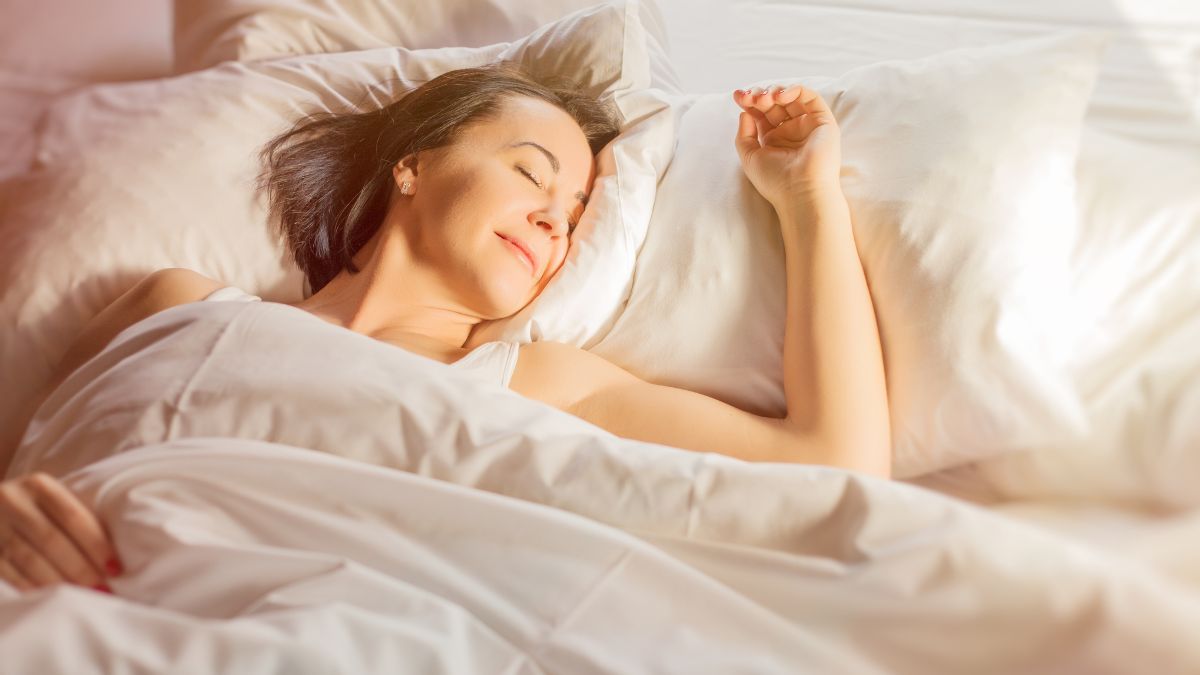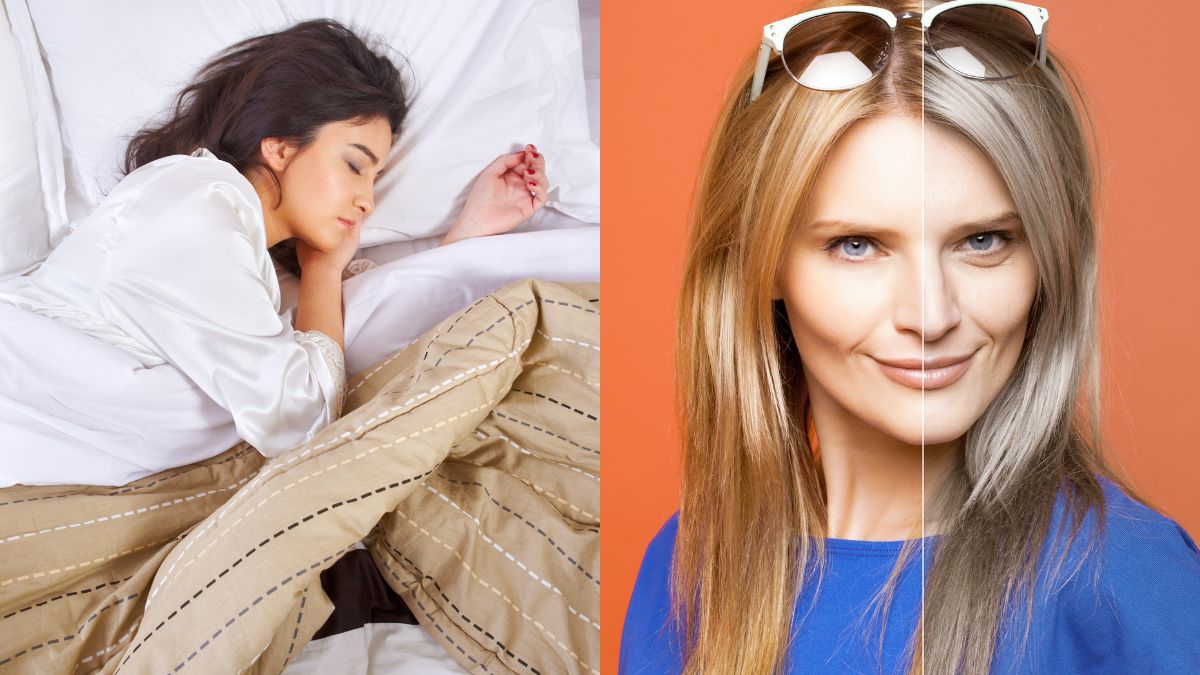- By Priyanka Munshi
- Thu, 07 Dec 2023 05:00 PM (IST)
- Source:JND
Do you know that one of the most important factors in aging well is getting enough sleep? Many people don't know about it. Getting enough sleep is essential for the body's regeneration and repair processes, which improve general health and wellbeing. The body releases growth hormones while you sleep deeply. Growth hormone is necessary for tissue repair and muscle mass maintenance.
Sufficient sleep also boosts immunity, assisting the body in fending off ailments that hasten aging. Not only that, but getting enough sleep lowers the risk of age-related cognitive decline and emotional stress while also enhancing emotional and cognitive health.

Getting enough sleep is essential for the body's regeneration and repair processes, which improve general health and wellbeing. (Image Credit: Canva)
Dr. Jyotsna Arora, who is a scientist in medical and technical affairs at P&G Health, exclusively told Jagra English about how quality sleep can slow down the clock.
Dr. Jyotsna said, "Aging is a natural part of our life cycle that is meant to be faced by one and all. While there is no definitive escape from this ticking clock, one could definitely slow down the pace. Did you know that all of us have access to one of the most effective ways to slow down the aging process? Yes, there is no need to frantically look around, because quality sleep is the golden key to aging gracefully. Many of us may be ignoring the most essential aspect of life—sleep—in the midst of our hectic daily routines."
Also Read: Top 6 Superfoods For Female For Improving Sexual Health
In addition, she added, "However, if we stop to consider the negative effects of not getting enough sleep, we can realize that it can have a significant impact on our general wellbeing. While we cannot prevent the aging process, we can help by avoiding doing things that accelerate it. Do you know that compromising sleep may prevent you from aging gracefully? Let’s look at why quality sleep is so important and how poor sleep might impact our biological aging."
The Correlation Between Sleep And Aging:
When we sleep, our bodies go through a number of restorative activities that are essential for our general health and wellbeing. The release of growth hormone is one of these processes that is particularly important. Growth hormone is crucial for the body's tissues, including the skin, to repair and regenerate. When you have sufficient deep and uninterrupted sleep, your body releases the right amount of growth hormones, which in turn aid in skin repair and collagen production. As we age, the production of collagen reduces with time, thus making our skin look dull and lacking in firmness. But with quality sleep, one could slow down this decline, thus helping to achieve youthful and firm skin.
The Power Of Melatonin: The "sleep regulator," melatonin, is another crucial factor in the fight against aging. Melatonin controls sleep and is a strong antioxidant. It aids in the fight against free radicals, which can harm cells and quicken aging. Our body's ability to produce melatonin naturally declines with age.
Sleep And Cognitive Sync: Aging gracefully is not just all about the outer appearance but also maintaining and preserving your cognitive ability. Brain health and good sleep are strongly connected. The brain consolidates memories and integrates information during deep sleep stages. On the other hand, a lack of sleep can cause memory issues, cognitive decline, and a higher risk of diseases like Alzheimer's. You may maintain your cognitive acuity as you age by placing a high priority on restful sleep.
Now that you know the key factor to aging gracefully lies in your sleep quality, here are six things you can try to help you get a good night's rest:

Sufficient sleep also boosts immunity, assisting the body in fending off ailments that hasten aging. (Image Credit: Canva)
1. Maintain A Consistent Sleep Schedule, Even On Weekends: Follow and stick to a regular sleep and waking pattern. Your body will soon become used to this rhythm, and as bedtime approaches, you'll start to feel sleepy.
2. Consider Using Sleep Supplements: Taking a non-addictive melatonin sleep supplement to supplement your body’s melatonin levels can support a good night’s rest by helping you fall asleep fast.
3. Reduce The Usage Of Electronic Devices Before Bedtime: Melatonin is a naturally occurring substance produced by our body to coordinate the sleep cycle, and blue light emissions from electronics are known to reduce its levels. To eliminate interruptions when sleeping, don't forget to turn off or put electronic devices on mute before putting them aside!
4. Avoid Drinking Caffeine In The Evening: Certain foods may keep you up at night. One such food that can interfere with your sleep cycle is caffeine. Caffeine should not be consumed right before bed.
5. Treat Yourself To A Relaxing Bath: After comfortably warming up your body in the water, transitioning to a cooler bedroom will naturally encourage your body to fall asleep while maintaining a state of complete relaxation. Consequently, immersing yourself in a bath (possibly accompanied by scented candles) becomes a pleasant method to unwind and, in the end, facilitate sleep.
6. Listen To Relaxing Music Or Soothing Sounds: Listening to soothing music and gentle sounds at a relatively quiet level has proven to be an effective method for aiding sleep. However, we strongly advise setting a timer to ensure that the music or sounds stop playing, allowing you to enjoy a peaceful, uninterrupted sleep without any lingering background noise.
(Talk to your healthcare provider if you have any questions about sleep supplements with melatonin and/or herbs. If you are experiencing long-term sleep difficulties, consult a healthcare professional to identify and treat any underlying causes.)

